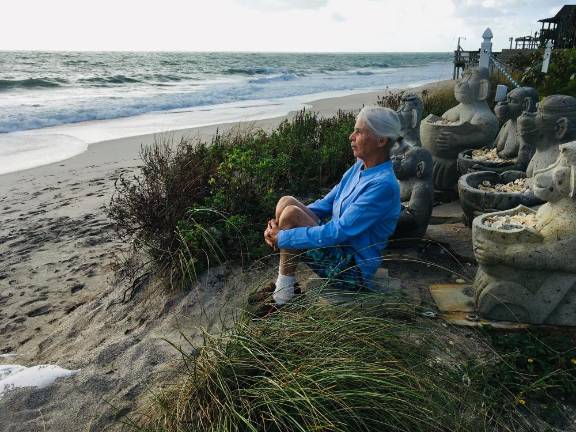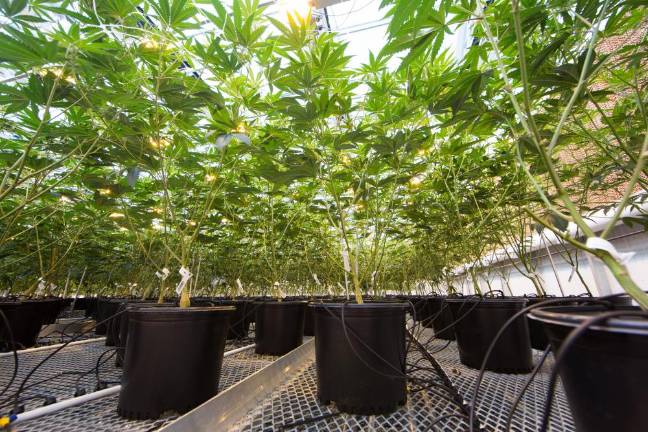Marijuana-years*
A thoroughly unscientific exploration of smoking pot for the long haul



We know pretty well how getting stoned works in the brain, and how it feels: the hilarity, the brightened colors, the quicksand-nature of time, the munchies. Wait, what were we just talking about? Oh right, the distractibility, the capacity for a few hours to forget all about your to-do list (or the inability to remember it). Sometimes, if you’ve had too much, the anxiety or panic.
But what does smoking pot year after year do to you? The science is all over the map (see sidebar), ranging from nothing much, to lopping off IQ points, to over-sensitizing you to the allure of other drugs, to increasing the odds you’ll attempt suicide. But that’s only the half of it that science can even begin to touch. If you think about Bob Marley, dreds wreathed in smoke, it’s something deeper and more essential you feel, more like his soul quotient.
We spoke to two women who have smoked pot for at least a decade in an open, thoroughly unscientific inquiry into how their long-term relationship with cannabis has affected them, good, bad or indifferent. One was quitting, the other was about to take her Friday toke.
Kathy Thomas, who will be 80 this summer, started smoking around 30, when the youngest of her four kids were toddlers."For me, always, it’s been a wonderful energizer," she said. "As I’ve grown older I have used it very much medicinally, for that energy, and it really has been for me a tremendous help, medicinally, for keeping me active."
Rheanna Woodford, 26, started smoking socially at 14, and at 16 it became a daily habit. “I don’t regret my upbringing with it because it has definitely influenced the way I’ve interacted with the world so far,” she said. “But I just feel like I’ve outgrown it.” As her asthma worsened and her meditation practice strengthened, it became clear: 2020 was the year she would give it up.
The women have much in common, starting with the unguarded disposition required to go on record about a habit that many share but few cop to. Both have expertise in health care. They both live in states where marijuana is free-flowing – Thomas in southern Vermont, Woodford in central Maine. They agree that pot sparks their creativity, but eventually came to interfere with their spiritual life. Both respect marijuana as a potent medicine, one that motivates them to get outside. And both suspect it may also be a subtle contributor to some of the health epidemics we’re facing, like obesity and asthma.
For herself, Thomas has always thought of marijuana as “a very innocent drug" that has featured in the entirety of her adulthood. "All my life, in and out, always. Never with concern, or seeking it, you know, when it wasn’t available,” she said. She finds it triggers the desire to write, sometimes poetry, “you know, if I don’t get too-too stoned. That’s kind of the moderate-stoned.”
The apples don’t fall far from the tree, and sometimes after a session with her grown kids, they'd all start talking over each other at once. On those occasions, it was possible that she got "too energized by it, you know? I got too out-there if you know what I mean, as far as talking and energy."
“I never had anything but good feelings about it – except at times I felt like it was a very large ego booster, and as I’ve grown older I don’t like that aspect of it," she said. "When the kids are around, I have to pre-set myself: this is not about you. This is about all of them. And they shut me down pretty quick, too, but you know what I mean.”
About nine percent of people who smoke marijuana become dependent, according to the 2011 National Epidemiologic Survey on Alcohol and Related Conditions. Thomas isn’t one of them. After going back to nursing school in her 50s and taking a nursing job in a small town in Maine, she didn’t come across marijuana or seek it, only partaking when her kids came to visit. For the two months she served as a nurse on a maritime cruise where she had “seriously no access,” she said, “I don’t remember any sense of withdrawal.”
After she and her partner, Edie, moved to rural Guilford, VT (population 2,100), a covered-bridge fanatic’s dream, she was surprised to discover “the access has been amazing,” Thomas said. “Everybody smokes! Older people that I would never brought it up to, friends on the road here, they smoke! I don’t think I’ve bought pot for years. I don’t even seek it out anymore, I just wait for it to come my way.”
A self-taught carpenter and self-diagnosed obsessive-compulsive cleaner, Thomas is in constant motion on her five-acre property. In their seventies, she and Edie decided to start an apron-making business, cranking out thousands of wildly colorful, reversible aprons and napkins, which were for sale in nine co-ops by the time they hung it up last year. “We still look at one another now that we’ve given it up and say, how in hell?” Thomas laughed. “We must have been in that sewing room morning, noon and night.” Did marijuana make those long days in the sewing room more enjoyable? “Oh yeah,” said Thomas. “That was easy, because I was just the cutter. Definitely.”
As a nurse, Thomas recognizes that marijuana may be “a subtle culprit with the obesity problem that we’re facing. Because definitely my appetite is enhanced. Older, that isn’t a problem, because I’m very thin right now, the thinnest I think I’ve ever been. Oh, and Edie and I are strictly vegan, but when I start smoking man – if you put cheese in front of me I’d probably eat the whole platter.”
She has started exploring the THC oils that come in “beautiful drop bottles,” and thinks she might prefer those. “It’ll probably be my choice as I get even older because I’m not so keen on the smoking as much, you know, the inhaling. It never bothers me, but I’m liking these oils, let’s put it that way.”
Thomas, a live wire, may be the poster girl for why using cannibis as an adult could be a good idea. “It really has been a tremendous help for keeping me active,” she said. “I do all the painting, interior, exterior. I do all the maintenance," not to mention the Sisyphean job of mowing. "I’m pretty amazing, actually, in that respect,” she acknowledges. “I enjoy it, you see.”
There are two spheres of her life that Thomas has found do not mix well with marijuana. One is carpentry, “because of the machinery. I’ve tried a few times but it’s not smart.” The other is her spiritual practice. Thomas, who grew up on Long Island, spent three years at Catholic missionary school after high school and was nearly ordained a nun. She used to find that smoking dovetailed nicely with her spiritual work, but not anymore.
Her reading has gotten “heavy duty" lately, and seems to go better “when I am not whoop-de-do because I get too distracted,” she said. “Like right now I’m studying the desert fathers of Mount Athos, and reading a work called The Philokalia. If you picked it up and read one page, you’d probably throw it in the fire if you were stoned... So I make sure that I wait ‘til after that.”
When we spoke it was Lent, and Thomas had cut back from smoking perhaps a few times a week to once a week. As we finished up our conversation she realized it was about that time: “Oh gosh it’s Friday!,” she said. “Nice!”
Rheanna Woodford grew up in Nashua, a city in southern New Hampshire, and started smoking socially at 14. “I didn’t have access to it by myself,” she said, “so I would always hang out with friends that would smoke in high school.” By 16, she was toking up daily with her friends. Starting in adolescence makes Woodford about twice as likely to develop a marijuana dependence – which she did.
At the University of Maine, Farmington, Woodford danced hip-hop and jazz, and taught Zumba, while getting her degree in “ironically enough, rehabilitation services.” She started buying pot from friends who grew. “College is when it started to become more my own practice,” Woodford said. “It was a way for me to relate to different people. We would not have much in common other than that we would smoke weed together.”
She smoked to "feel more connected to spirit," "see the signs and synchronicities," and "feel more connected to the Earth and myself.” She also smoked “before class, before work, while driving, you know, whenever I wasn’t supposed to? I would wake and bake every morning. It kind of became part of my everyday life, who I was becoming.”
It wasn’t heroin or crack, and in fact, she’s grateful to the plant that she feels nurtured her free spirit. But she’d been stoned her entire adult life. “That was my constant state of being,” she said. Increasingly, she was nagged by the feeling that she was stuck in the same old patterns. “I do feel like it’s spiritual training wheels, in that it’s a quick and easy way to obtain that enlightened feeling,” she said. “But I wanted to do it on my own.”
She’d quit a few times, including a stretch of a year and a half in college when she steered clear of pot and alcohol for a year, until telling herself she’d smoke just once at a friend’s party. But most times she quit, she ended up drinking more, which was something she certainly didn’t want to mess around with. She’s tried to be patient with herself. After all, she’s heard that it takes seven times to quit for good, “so it’s really a forever journey.”
Ten days into sobriety, this time already feels different. She does miss being high, which motivated her to go into the woods and made her feel "really in tune with spirits.” But she has a tool now that she didn't the other times: she's been practicing transcendental meditation for a year and a half. When she gets bored and finds herself craving weed, “I’ll just sit and I’ll breathe through it,” she said. “Or just distracting myself, maybe going on Facebook,” which, she laughs, “is another addiction.”
Another big motivator is that her mom, a cigarette smoker, is quitting too in solidarity. “When I quit for a year she also quit with me but we both started back up again," said Woodford. "So we both kind of took that leap of faith again.”
There’s a mounting sense of urgency, a sort of now or never feeling about this time. “Everything in my being is calling me to stop,” Woodford said. “Even though I like it, I gotta listen to that. And it’s been telling me for years.”
Physically, too, she's worried that if she doesn't start eating better and focusing on her physical health, she's on a one-way fast track to chronic disease. “You start getting the munchies, you start eating really just snacky foods, and overeating,” she said. "I feel like if I don’t evolve, then my body is going to start shutting down," she said. "I feel like my organs are going to stop working, I’m going to need surgeries. And I’m only 26, I can’t have that."
Her asthma had gotten so bad that before she quit smoking, she’d been taking her inhaler every two hours throughout the day, even waking up at night having to take it because she couldn’t breathe.
“I used to have to take my inhaler after cleaning my guinea pig’s cage, but I noticed last time I didn’t have to, which is awesome,” she said.Woodford is a rehabilitation specialist at a clubhouse for mentally ill adults. She works side by side with clubhouse members, doing everyday tasks like cooking, data entry, cleaning the bathrooms, doing community presentations, and generally preparing them to go out into the workplace.
In the year and a half she's been at her job, she has developed real relationships with the clubhouse members, focusing on their strengths – in computers, say – instead of their illness, watching them gain confidence as they work alongside one another. For their sake, as well as for her own, Woodford wants to feel unconflicted about being a role model. “There’s a couple members that definitely smoke weed, but they can’t be under the influence at work, obviously. I’ve definitely had to lie to them before when they’ve straight-up asked me if I smoke,” she said.
Recreational marijuana is about to be legalized in Maine, but for both Woodford and Thomas, legality has always been beside the point. Legal or not, Woodford feels it's not the right behavior to model to people trying to get their feet under them. “I want to be someone they can look up to in a genuine way," said Woodford. "I don’t want to have to lie to them if they ask me if I smoke marijuana."
About everything else, “I’m really up-front with them," she said. "I say we’re all struggling with something. Just because we’re not diagnosed doesn’t mean we’re not struggling. The best way I know how to help them is to make them laugh. I can take on the goofy persona, but also be work-appropriate when I need to be. But I like making them laugh.”